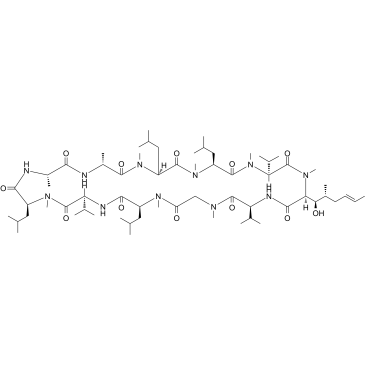Does the binding of cyclosporine to calmodulin result in immunosuppression?
S J LeGrue, R Turner, N Weisbrodt, J R Dedman
Index: Science 234(4772) , 68-71, (1986)
Full Text: HTML
Abstract
The cyclosporines are a family of cyclic endecapeptides that cause a profound suppression of primary immune stimulation both in vitro and in vivo. Recently, the regulatory protein calmodulin (CaM) has been implicated as a target for cyclosporin A (CsA) binding. This study utilized two less-active isomers of CsA to evaluate the specificity and biological significance of CaM binding. The three cyclosporines exhibited equivalent in vitro binding to CaM, regardless of immunosuppressive activity. Furthermore, CaM-dependent enzyme systems were inhibited equally by active and inactive cyclosporines, but only at concentrations 100 times those necessary to block lymphocyte activation. Thus the exquisite immunosuppressive stereospecificity displayed by cyclosporine isomers is not reflected in the binding to and inhibition of CaM, suggesting that inhibition of CaM-dependent processes is not sufficient to explain the immunosuppressive activity of CsA.
Related Compounds
| Structure | Name/CAS No. | Molecular Formula | Articles |
|---|---|---|---|
 |
Val2-Cyclosporine
CAS:63775-96-2 |
C63H113N11O12 |
|
Antimalarial activity of cyclosporins A, C and D.
1994-03-01 [Afr. J. Med. Med. Sci. 23(1) , 47-51, (1994)] |
|
Enzymatic synthesis of cyclosporin A.
1987-12-25 [J. Biol. Chem. 262(36) , 17258-9, (1987)] |
|
In vitro and in vivo comparative studies on immunosuppressiv...
1993-01-01 [Immunopharmacol. Immunotoxicol. 15(2-3) , 163-77, (1993)] |
|
The weak immunosuppressant cyclosporine D as well as the imm...
1988-01-29 [Biochem. Biophys. Res. Commun. 150(2) , 545-51, (1988)] |
|
Synergistic effects of cyclosporin analogs--A, D, G, IMM-125...
2006-05-31 [Transplant. Proc. 26(5) , 3021-4, (1994)] |